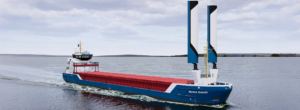
Photo credit: InterManager, Captain Kuba Szymanski, Secretary General
Ship managers´association InterManager urges European Commission to follow the ”polluter pays” principle when finalising legislation for the reduction of greenhouse gas emissions from shipping in European waters.
The association is concerned that proposed legislation could miss its mark if it holds ship management firms accountable for emissions reductions, rather than target the parties who control key pollution-related aspects of ship operation such as fuel, machinery and vessel speed.
The European Commission is set to finalise legislation which will include GHG emissions from maritime transport within the EU Emissions Trading Scheme (EU-ETS).
InterManager, which represents 80% of the world’s largest ship management companies, has submitted a position paper to inform this discussion. Its concerns centre on the definition of the entity responsible for ETS compliance.
In its submission, InterManager says that “the huge financial risk imposed on ship managers by the revised ETS Directive is disproportionate to the negligible influence managers have in respect of the emissions generation by maritime transport”.
InterManager urges the Commission to word the regulation carefully to ensure the correct parties are in focus, saying: “Under a Polluter Pays Scheme such as EU-ETS, the default responsible party should be the one controlling the highest number of emissions relevant aspects, not the one with the lowest.”
InterManager points out that “as technical ship managers we take care of repairs, maintenance and crewing for, and on behalf, as agents of our customers the shipowners. Most of a vessel’s emission relevant key aspects are outside our remit – the speed, predominantly determining the consumption, as well as the trading area of the vessels are contractually agreed between shipowner and charterer in the Charter Party Contract, without involvement of the technical ship manager”.
The ship managers association also notes that ”the type of fuel used, the engines and other machinery installed on the vessels are decided by the shipowner when ordering or buying the vessel, also outside our remit”.
InterManager Secretary General, Captain Kuba Szymanski, commented: “It would be patently unjust if the EU legislation forcibly imposed that the ship manager shall be the regulated entity, this would be similar to holding the facility manager responsible, not the factory owner.”


